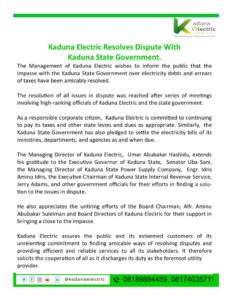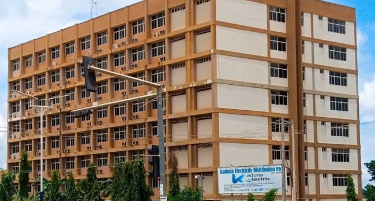On August 2, the Kaduna Internal Revenue Service (KADIRS) took the significant step of sealing the headquarters of Kaduna Electric, the distribution company (DisCo) responsible for electricity in the state. The action was prompted by an alleged N600 million in unpaid taxes, which KADIRS claims had been outstanding for some time. The Executive Chairman of KADIRS, Jerry Adams, explained to journalists that the decision to seal the company’s premises was carried out after obtaining the necessary court order, signaling the seriousness of the situation.
In a surprising turn of events, shortly after the sealing of its headquarters, Kaduna Electric responded by disconnecting power supply to several key state government facilities, including the Government House. The company cited an unpaid debt of N2.9 billion owed by the Kaduna State Government as the reason for this drastic action. The disconnection of power to such critical government facilities underscored the severity of the financial dispute between the state government and the electricity distribution company.
However, the tension between Kaduna Electric and the state government did not last long. In a statement released later, Kaduna Electric confirmed that all issues in dispute had been amicably resolved following a series of high-level meetings. These meetings involved senior officials from both the company and the state government, who worked together to find a solution to the standoff.
The company emphasized its commitment to fulfilling its tax obligations, stating, “As a responsible corporate citizen, Kaduna Electric is committed to continuing to pay its taxes and other state levies and dues as appropriate.” This statement reflects the company’s acknowledgment of its role in contributing to the state’s revenue through tax payments and other financial obligations.
On the other side, the Kaduna State Government also made a commitment to settle its electricity bills, particularly those of its ministries, departments, and agencies. The statement from Kaduna Electric highlighted that the state government had pledged to ensure that these payments would be made promptly in the future. This mutual understanding between the two parties marks a significant step towards maintaining a positive working relationship and avoiding similar conflicts in the future.

The Managing Director of Kaduna Electric, Umar Abubakar Hashidu, expressed his gratitude to various stakeholders who played pivotal roles in resolving the impasse. He extended his thanks to the state governor, Uba Sani, for his leadership and involvement in the discussions. Hashidu also acknowledged the contributions of the Managing Director of Kaduna State Power Supply Company, Idris Aminu Idris, and the KADIRS Chairman, Jerry Adams, for their roles in facilitating the resolution of the dispute.
Additionally, Hashidu expressed his appreciation to the Board Chairman of Kaduna Electric, Aminu Abubakar Suleiman, and the board directors for their unwavering support during the challenging period. He noted that their backing was instrumental in ensuring that the company could navigate the situation and reach an amicable resolution with the state government.
The resolution of this conflict between Kaduna Electric and the Kaduna State Government is a positive development for both parties. It highlights the importance of dialogue and collaboration in resolving disputes, particularly when public services and financial obligations are at stake. By addressing the issues at hand, both the distribution company and the state government have set a precedent for how such conflicts can be managed in the future, ensuring that service delivery to the public is not unduly disrupted.
This incident also serves as a reminder of the complex relationship between public utilities and government entities, where financial obligations on both sides must be carefully managed to avoid disruptions that could impact the broader community. As both Kaduna Electric and the state government move forward, the lessons learned from this situation will likely inform their interactions and financial dealings in the future, helping to foster a more stable and cooperative environment for all stakeholders involved.




